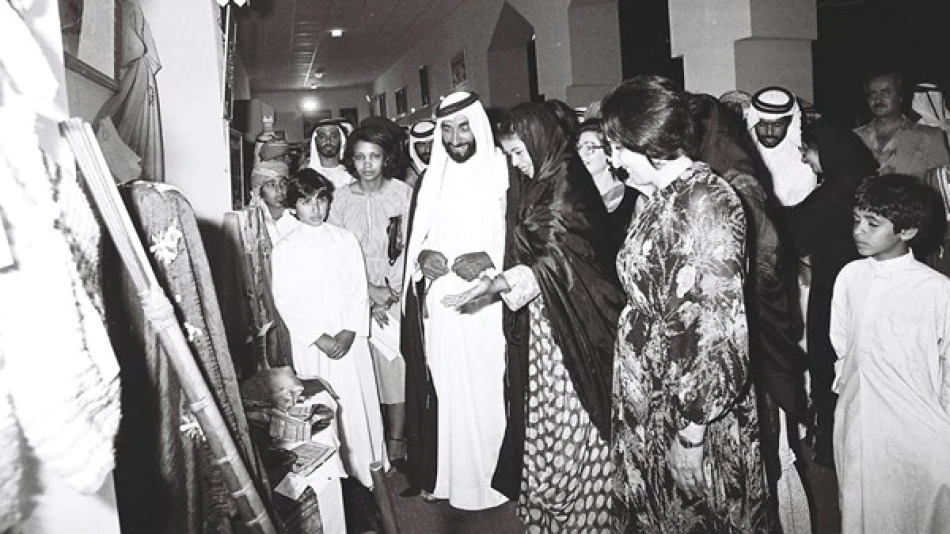
UAE Celebrates Emirati Women's Day: Empowering the Driving Force of the Nation
UAE's Women's Day Marks Half-Century of Strategic Gender Empowerment
As the UAE prepares to celebrate Emirati Women's Day on August 28, the nation showcases a remarkable transformation that positions it as a global model for systematic gender balance. This year's celebration, marking 50 years since the establishment of the General Women's Union, demonstrates how strategic leadership vision can accelerate women's advancement beyond regional norms and compete with progressive Western democracies.
From Vision to Global Leadership
The celebration coincides with the anniversary of the General Women's Union's founding in 1975, established under the guidance of Sheikha Fatima bint Mubarak, known as the "Mother of the Emirates." This year's theme, "Hand in Hand... We Celebrate the Fifty," reflects a calculated approach to women's empowerment that has evolved from basic inclusion to strategic leadership development.
The UAE's approach traces back to founding father Sheikh Zayed bin Sultan Al Nahyan's philosophy: "Nothing makes me happier than seeing women take their distinguished role in society, and nothing should hinder their progress." This foundational principle has been systematically implemented through legislative frameworks rather than symbolic gestures.
Legislative Architecture for Gender Balance
The UAE has enacted comprehensive legal reforms across more than 20 areas of legislation, covering employment, political participation, personal status, judiciary, banking, entrepreneurship, and retirement benefits. This legislative overhaul represents one of the most systematic approaches to gender equality in the Middle East, comparable to progressive policies seen in Nordic countries.
Strategic Policy Framework
The National Policy for Women's Empowerment 2023-2031, approved by the Cabinet under Sheikha Fatima's direction, transforms women's advancement from ad-hoc initiatives into a strategic national vision. This policy provides a reference framework for federal, local government, and private sector decision-makers, ensuring consistent implementation across all sectors.
The Gender Balance Strategy 2022-2026 positions the UAE to transition from following best practices to exporting gender balance solutions globally. The strategy focuses on four pillars: economic participation and entrepreneurship, well-being and quality of life, protection, and global leadership partnerships.
Political Representation Beyond Tokenism
Emirati women now occupy 50% of Federal National Council seats, ranking among the world's highest rates of women's parliamentary representation. This figure surpasses many established democracies, including the United States (27%) and the United Kingdom (35%). Women hold strategic ministerial portfolios in education, culture, community development, and international cooperation—sectors that directly influence national development priorities.
In diplomatic circles, Emirati women serve as ambassadors and consul generals in major global capitals, representing the nation in international organizations and leading UAE delegations at climate conferences, innovation summits, and scientific forums.
Market and Investment Implications
The UAE's systematic approach to gender balance creates significant advantages for international businesses and investors. Companies operating in the UAE benefit from a more diverse talent pool and leadership pipeline, while the country's gender balance credentials enhance its attractiveness for ESG-focused investments and multinational headquarters.
The emphasis on women's entrepreneurship and financial inclusion also expands domestic market opportunities, as women-led businesses contribute to economic diversification beyond oil revenues. This aligns with the UAE's broader Vision 2071 to become the world's best country by its centennial.
Regional and Global Context
The UAE's progress contrasts sharply with regional trends and positions the nation alongside progressive countries like Singapore and Denmark in gender equality metrics. While neighboring countries focus primarily on basic women's rights, the UAE has moved toward strategic gender balance as a competitive advantage in the global knowledge economy.
This advancement reflects the UAE's broader strategy of leveraging social progressiveness to attract international talent, businesses, and investment in an increasingly competitive global landscape. The systematic nature of these reforms suggests sustainability beyond individual leadership changes, embedding gender balance into the country's institutional framework.
The celebration of Emirati Women's Day thus represents more than ceremonial recognition—it marks the maturation of a strategic national asset that enhances the UAE's global competitiveness and soft power influence.
Most Viewed News

 Layla Al Mansoori
Layla Al Mansoori






